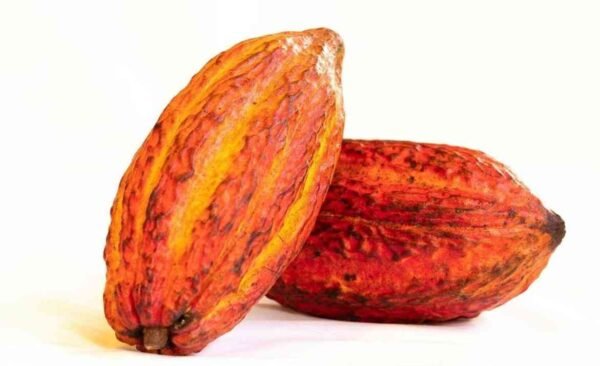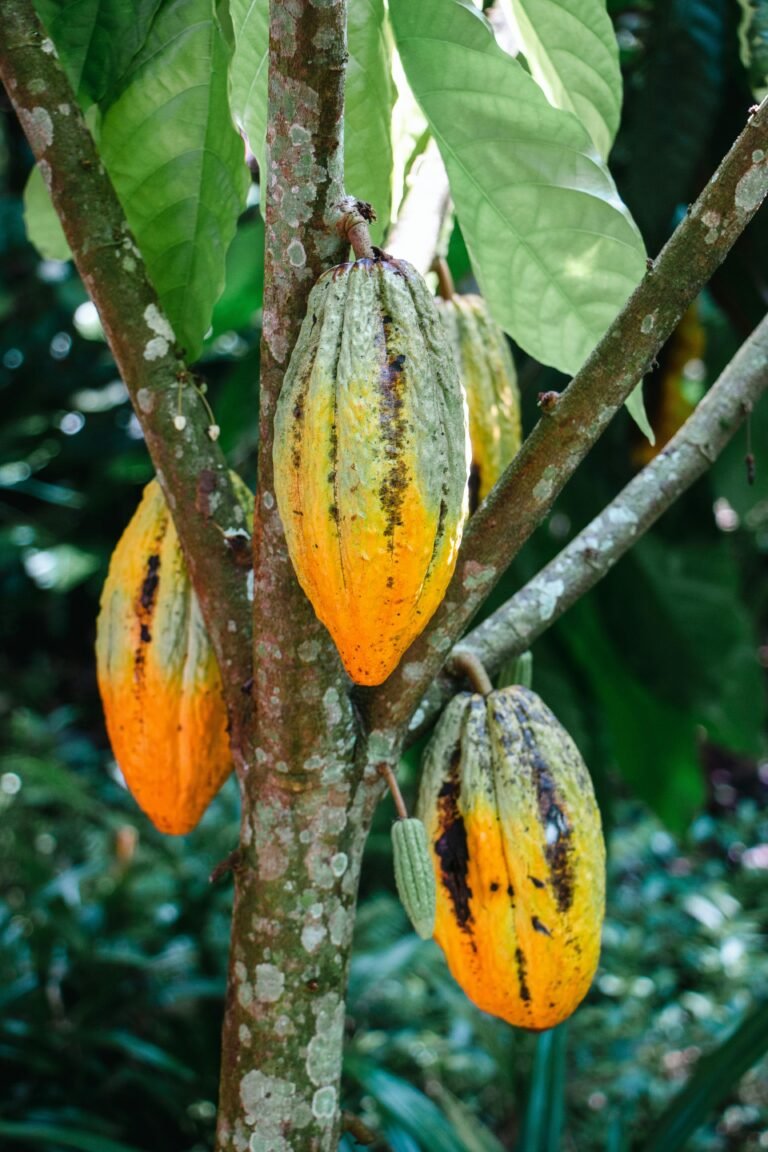
Pure cacao is considered as a nutritional powerhouse. Nowadays people are showing more interest in cacao due to its extensive health benefits.
The raw and unprocessed form of cacao offers numerous health benefits, including being a rich source of antioxidants, flavonoids and minerals; potentially supporting heart health, improving metabolism, boosting mood, reducing inflammation and many more other health benefits it provides.
Before knowing the detail Health Benefits of Pure Cacao Powder, let’s first know the nutritional profile of cacao powder.
Nutritional Profile of Cacao Powder
Cacao powder is packed with nutrients, including minerals such as iron, zinc, magnesium and selenium.
One tablespoon of cacao powder includes:
| Nutrient | Amount |
|---|---|
| Calcium | 6 milligrams |
| Iron | 1 milligram |
| Magnesium | 26 milligrams |
| Phosphorus | 39 milligrams |
| Potassium | 135 milligrams |
| Zinc | Less than 1 milligram |
| Selenium | 1 milligram |
| Folate | 2 micrograms |
18 Health Benefits of Cacao
Research considered that cacao is a nutritional powerhouse. Cacao powder provides lots of health benefits, especially if your powder is raw, unprocessed or minimum processed.
Here is the detailed look at some of the health benefits of pure cacao powder:
1. Rich in Antioxidants:
Cacao is a superfood rich in antioxidants, particularly flavonoids, that help to protect the body’s cells from damage caused by the free radicals. Not only that, this powerful antioxidant flavonoid also helps protect against oxidative stress and inflammation. They also contribute to heart health and may improve blood flow.
Polyphenols is another type of antioxidant found in cacao. Polyphenols can help lower blood sugar levels and cholesterol and also reduce the risk of heart disease. Theobromine, this compound also found in cacao, is known for its anti-inflammatory properties and may protect against certain diseases.
2. Improves Cognitive Function
Regular cacao consumption can improve general cognition, attention, working memory and processing speed and also reduce mental fatigue. Much of this is thanks to caffeine, theobromine, and all those flavonols. The study found that it could even reduce some measures of age-related cognitive dysfunction.
3. Boosts the Immune System
Cocoa powder contains zinc, iron, and selenium. These minerals help in overall body function and boost the immune system.
Cacao can improve blood flow to the brain and heart, which may reduce the risk of heart attack, heart failure and stroke.
4. Supports the Gut
The gut microbiome is a vital and complex community of microorganisms residing in the digestive tract. It’s often referred to as “the second brain”. The gut microbiome plays an important role in human health, impacting digestion, immunity, and overall well-being. And an imbalance of this gut microbiome can lead to various health diseases.
A healthy gut can potentially prevent various health diseases. A healthy gut improves health conditions, including mood disorders, heart disease, arthritis, obesity, autoimmune conditions and cancer. Consuming cacao can offer a prebiotic effect, stimulating the growth of healthy gut bacteria.
5. Boosts Mood
Cacao can act as a natural mood elevator. Cacao is well known for its mood-boosting properties due to compounds like flavonoids, phenylethylamine (PEA) and serotonin, which can stimulate the release of endorphins and promote the feelings of well-being.
6. Improves Sleep Quality
7. Enhances Performance
Cacao can enhance performance, particularly athletic and cognitive performance, due to its impact on nitric oxide production, blood flow, and potentially, cognitive function. The flavanols properties of cacao can improve blood flow, potentially leading to increased oxygen delivery to the muscles. Additionally, some studies suggest that cacao consumption can improve cognitive performance during tasks that require sustained attention and concentration.
8. Protects Skin and Slows Down Ageing
Cacao can improve skin appearance due to its antioxidant and hydrating properties.
Cacao contains a compound named flavanols that may protect skin from UV sun damage and reduce wrinkles. Cacao may reduce UVB-induced wrinkle formation and prevent collagen degradation.
Skin Hydration: Cacao can improve skin hydration and nourishment.
Cacao may help slow down the ageing process due to its high antioxidant content, flavanols. This compound has been linked to improved skin health, cardiovascular health, and cognitive function, all of which contribute to a longer and healthier life.
Here’s a More Detailed Look at How Cacao May Help Slow Down Ageing:
Improved Skin Hydration and Elasticity: Cacao flavanols can improve skin hydration and moisture retention, potentially reducing fine lines and wrinkles.
Protect Skin from UV Damage: Cacao flavanols can help protect against skin damage caused by UV exposure, a major contributor to ageing.
Antioxidant Protection: The antioxidants in cacao can help neutralize free radicals, which are unstable molecules that damage skin cells and contribute to ageing.
Cognitive Function: Potential for Cognitive Improvement: Some research suggests that cocoa flavanols may help slow down cognitive decline and protect against age-related neurodegenerative disorders like Alzheimer’s and Parkinson’s diseases.
Cardiovascular Health: Cocoa flavanols can improve blood flow, which is essential for overall health and can help protect against cardiovascular disease, a major contributor to ageing. Reduced Blood Pressure: Some research suggests that cocoa flavanols can help lower blood pressure, reducing the risk of cardiovascular problems. Overall Health and Longevity: Anti-inflammatory Effects: Cacao flavanols possess anti-inflammatory properties, which can help protect against various chronic diseases linked to ageing.
9. Protects Teeth
Theobromine is an another compound found in cacao; it has antimicrobial properties that can help fight tooth decay and protect enamel.
10. May Support Metabolism
Studies suggest the plant compounds in cacao may support metabolism and influence immune function. Cacao is also a good source of dietary fiber, which is essential for a healthy digestive system.
11. May Improve Cholesterol
Cacao can help lower “bad” cholesterol (LDL) levels and reduce inflammation, further supporting heart health.
12. May Support the Heart and Cardiovascular System
Cacao can improve blood flow to the brain and heart, which may reduce the risk of heart attack, heart failure and stroke. Cacao’s dense concentration of theobromine and flavonols is largely responsible for its ability to decrease your risk of cardiovascular disease. Minerals like potassium and zinc (available in cacao) are also crucial in maintaining strong blood vessels and a healthy cardiovascular system. Cacao can lower high blood pressure, improve blood flow, prevent blood clots, raise “good” cholesterol (HDL), and protect against oxidation of “bad” cholesterol (LDL).
Studies suggest that regular consumption of cacao can lower blood pressure, improve blood vessel function, reduce inflammation, and may help lower the risk of heart disease and stroke. These benefits are attributed to compounds like flavonoids, theobromine and polyphenols, which have antioxidant and anti-inflammatory properties.
13. May Help You Lose Weight
Since cacao is rich in phytonutrients but low in fat and sugar, the calories you get from cacao powder are packed with healthy chemicals. Studies have shown that cacao helps regulate energy use and metabolism while also increasing feelings of fullness. Cacao powder may actually help reduce weight while providing important nutrients.
14. May Help Heal Wounds
Cacao contains plenty of zinc, a mineral that is useful for healing wounds.
15. May Keep Muscles and Nerves Healthy
Cacao may indeed contribute to healthy muscles and nerves. Cacao is rich in antioxidants like flavonoids, which can help protect nerve cells and reduce inflammation, potentially benefiting both muscle and nerve function. Additionally, cacao contains magnesium, a mineral crucial for muscle and nerve function.
16. May Improve Brain Health
Cacao is rich in flavonoids, which act as antioxidants and may protect brain cells from damage. There is evidence suggesting that cacao may improve brain health. Research from the National Institutes of Health (NIH) suggests that flavonoids in cacao can improve blood flow to the brain and enhance cognitive function. Cacao may improve memory and reduce the risk of cognitive decline. Flavonoids may also play a role in protecting brain cells from damage caused by oxygen radicals and promoting neuronal survival, which is crucial for maintaining brain health.
17. Lowers Blood Pressure
Cacao, can contribute to lowering blood pressure. This is primarily due to the high levels of flavanols in cacao, particularly epicatechin, procyanidins and catechin, which promote vasodilation and improve endothelial function.
Flavanols in cocoa can increase the production of nitric oxide, a compound that helps relax blood vessels, leading to lower blood pressure.
Flavanols also possess antioxidant and anti-inflammatory properties, which can further contribute to improved blood vessel health and reduced blood pressure.
18. May Reduce Inflammation
Cacao is rich in flavonoids and antioxidants that can help reduce inflammation in the body and may offer protection against various diseases. Cacao is also rich in polyphenols, which are natural antioxidants that can help protect the body from damage caused by free radicals, a key contributor to inflammation. Studies have shown that cacao consumption can help reduce inflammation in the body, potentially lowering the risk of chronic diseases like heart disease. Cacao can influence immune cell function, potentially reducing the release of inflammatory molecules.
Side Effects of Cacao Powder
While cacao offers numerous health benefits, but overconsumption of cacao can lead to side effects like bloating or discomfort from excess fiber, and a rare allergic reaction is possible.
Overconsumption and Digestive Issues: Due to excessive fiber in cacao can cause discomfort or bloating in some individuals.
Allergic Reactions: Some people may experience allergic reactions to cacao, although it is in rare cases.
Theobromine and Sleep: Theobromine, a stimulant in cacao, which can cause sleep issues in some people, especially in sensitive individuals. So, it is important to consume it in moderation.
Heavy Metals: Some cacao products can contain elevated levels of cadmium and lead, which can be toxic to the bones, kidneys, and other body tissues.
Caffeine: While cacao contains less caffeine than coffee, it still provides a stimulating effect. So, be careful adding too much cacao in your diet. Caffeine has been linked to nervousness, increased urination, sleeplessness, migraines, stress, high blood pressure, and a fast heartbeat in some people.
Pregnancy: Pregnant women should be cautious about consuming cacao, especially during the third trimester, as it may constrict a major blood vessel crucial for fetal circulation.
Pets: Cacao contains a chemical compound called theobromine. Theobromine is highly toxic to pets like dogs and cats and can cause vomiting, diarrhea, extreme thirst and urination and other symptoms.
Medication Interactions: Cacao may interact with certain medications, including blood pressure medications, blood thinners, stimulants and diuretics, so it’s important to consult a healthcare professional if you are taking any of these medications.
Talk To Your Nutritionist
This article is for educational purpose only, and should not be used as a substitute for medical advice. If you have any concerns about your diet or health, please contact your nutritionist or other relevant healthcare professional.
You may also like to read more detail about What is Cacao?




